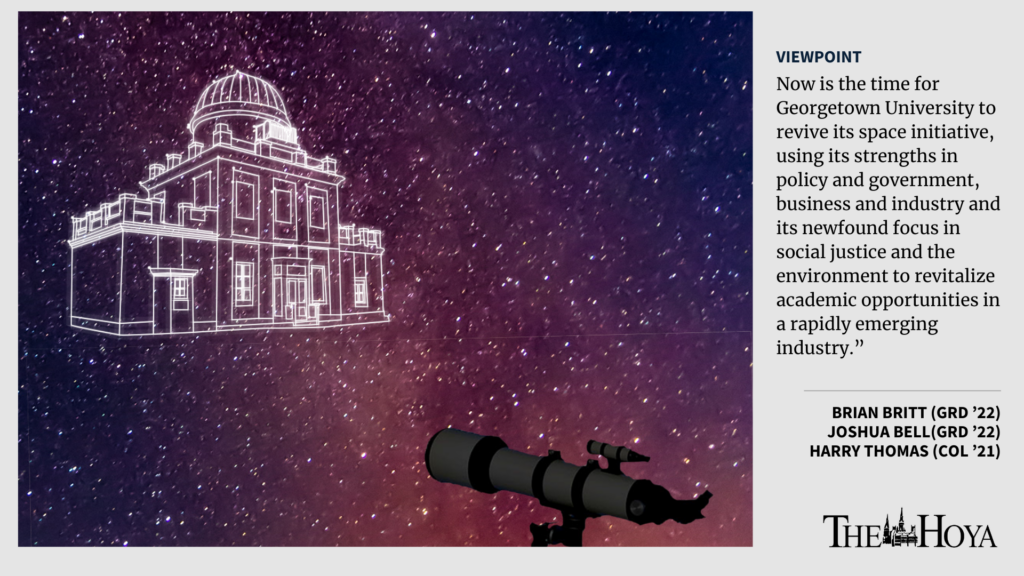Small, unassuming and dilapidated, the Heyden Observatory sits atop a hill on the western edge of campus, tucked behind Yates Field House. Its appearance fails to convey its rich relationship with astronomical history — a relationship unknown to most students.
Now is the time for Georgetown University to revive its space initiative, using its strengths in policy and government, business and industry and its newfound focus in social justice and the environment to revitalize academic opportunities in a rapidly emerging industry. As space becomes an increasingly important domestic and international area of activity, Georgetown students need opportunities — including but not limited to a multidisciplinary space study program and an institution dedicated to advancing space thinking — to stay competitive in the job market of the future.
Constructed in 1841, the Heyden Observatory is the third oldest observatory in the United States and has welcomed many famed and accomplished astronomers. It quite literally put Georgetown and Washington, D.C., on the map: Fr. James Curley used the observatory to determine the longitudinal coordinates of many major sites in the District in 1846.
Georgetown’s connection to space observation and science extends beyond the Heyden Observatory. Vera Rubin studied under Fr. Francis Heyden, a director of the Georgetown astronomical department, as a student in Georgetown’s graduate astronomy program. She went on to discover dark matter in the late 1970s after her time at Georgetown. Today, though we lack any institutionalized academic focus on space studies, Georgetown is home to Sarah Johnson, a leader in the astrobiology field who has worked on NASA’s Spirit, Opportunity and Curiosity Rovers. Johnson is also a visiting scientist with the Planetary Environments Lab at NASA’s Goddard Space Flight Center.
Unfortunately, in recent decades, Georgetown has lost its historical focus on space. Georgetown shuttered its astronomy department in the 1970s, eliminating all administrative support for the Heyden Observatory’s maintenance and allowing it to fall into disrepair. Since then, the student-run Georgetown University Astronomical Society has worked to keep the observatory and the struggling campus space community afloat.
Space will become one of the most important subjects in the coming decades. The commercialization of space has permitted massive leaps in innovation, leading to increasingly bold missions in a market expected to triple in value to trillions of dollars in the decade. The U.S. military solidified its focus on space with the establishment of the Space Force. Increasingly frequent ventures beyond our atmosphere raise complicated ethical and legal questions. Whether related to business, government, law, science or the environment, space presents both a problem and an opportunity. Georgetown must prepare its students for this new world.
To address a neglected interest, two student groups serve extracurricular interests in space, intending to maintain and grow the space community on campus. GUAS, in addition to providing excellent care for the observatory, offers a home for students in astronomy, space sciences and the study of the cosmos. Alongside GUAS, the Georgetown University Space Initiative works to expand the Georgetown space community and advocate for a more space-focused curriculum. The group examines space policy, the commercialization of space and space exploration. Though GUSI and GUAS have managed to foster a vibrant space community at Georgetown, their members lack any outlet in institutionalized academics. This exclusion should change.
Proposals for an increase in space programs are also popular among faculty. Members of the science, technology and international affairs, biology and history departments as well as the Center for Security Studies have joined student groups like GUSI and GUAS in the Georgetown Space Advocacy Committee to push for a new, comprehensive space curriculum.
GSAC develops new ideas and sets goals focused on making Georgetown a home for space excellence. With these groups united, the progress toward increasing space courses and research is more promising than ever.
The growing demand for space opportunities throughout the Georgetown community necessitates action. In the short term, Georgetown needs more interdisciplinary classes that play to the university’s academic strengths and constitute a certificate or minor available to students across all schools. Georgetown already has the faculty to initiate this process, and they are ready and willing to begin making Georgetown a leader in space disciplines. In the long term, Georgetown should look into a universitywide space center that will give students, faculty and visiting industry leaders a place to advance their space studies. Students who support these proposed changes can join GUAS and GUSI to demonstrate student support for space curriculum.
The recent growth of Georgetown’s extracurricular space community is reflective of a larger global change. Space is an increasingly important aspect of modern society. Georgetown should respond to both on-campus interest and societal shifts by focusing resources on space studies to foster the next generation of national and global space leaders.
Joshua Bell is a first year in the Applied Intelligence Master’s Program. Brian Britt is a first-year in the Security Studies Master’s Program. Harry Thomas is a senior in the College.










Charles M. Chafer • Mar 5, 2021 at 11:37 am
Great to see. In the 1970’s the Georgetown Graduate School, led by Dean T. Stephen Cheston was a hotbed of space development activity producing future commercial and government leaders and publishing a NASA-funded book (of which I was a co-author) titled Social Sciences and Space Exploration, as well as creating the Institute for the Social Science Study of Space which published the Space Humanization journal series.